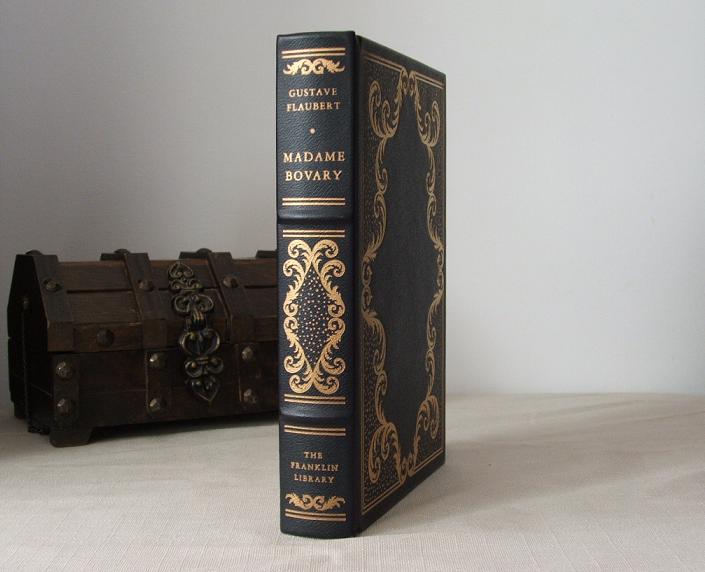
Easton Press Gustave Flaubert books
Three Tales - The Collector's Library of Famous Editions - 1978
Franklin Library Gustave Flaubert books
Madame Bovary - World's Best Loved Books - 1979
Three Tales - Collected Stories of the World's Greatest Writers - 1981
(This page contains affiliate links for which we may be compensated.)
Gustave Flaubert biography
Gustave Flaubert (1821-80) was a French novelist, born in Rouen. He studied medicine but gave up that profession to devote himself to writing. His life, with the exception of several trips to the Orient and to North Africa, was uneventful. From 1846 until his death he lived in Croisset, a suburb of Rouen, where he was visited by many leading contemporary writers, including the Russian novelist Ivan Turgenev and the French authors Edmond and Jules Goncourt, Guy de Maupassant, and George Sand.
Gustave Flaubert’s first and most widely read novel, Madame Bovary, which appeared originally (1856) in installments in the periodical Revue de Paris, quickly became a cause celebre. Both the author and the publisher were prosecuted on the grounds that the novel was immoral. Although they were acquitted, scandal clouded the reception of the novel in book form and it was some time before it won recognition as one of the masterpieces of French literature.
Madame Bovary relates, against a French provincial-town background, the romantically motivated adulteries of a married woman whose pathetically overblown love affairs end in her suicide. In essence the novel is an indictment of the drabness, pretensions, and petty delusions of bourgeois life, loathing for which was almost an obsession of Gustave Flaubert. Nevertheless, the tragedy of the novels characters, mediocre and dull though they are, is portrayed with powerfully effective perception. Madame Bovary has had a lasting influence as a masterpiece of realism.
Gustave Flaubert’s other important novels are Salammbo (1863) and La Tentation de Saint Antoine (1874). The former is a historical novel set in ancient Carthage; the letter is a retelling of the Christian legend of the temptations that beset the father of Christian monachism, Saint Anthony, in the solitude of the desert. Although these two novels are generally regarded as more romantic in character than Madame Bovary, nearly all of Gustave Flaubert’s writing combines significant naturalistic and romantic elements.
In his posthumously published letters Correspondance (4 vols. 1887-93), Gustave Flaubert attested to his experiencing "the agonies of art". The infinite care which he practiced in order to achieve an ultimate precision of detail and of language has become legendary. Gustave Flaubert’s devotion to art is nowhere more manifest than in the standard of perfection which he required of himself.
Gustave Flaubert’s other works include the novel L-Education Sentimentale (1869); three short stories published as Trois Contes (1877); a play, Le Candidat, produced unsuccessfully in 1874; and two posthumously published works, the unfinished novel Bouvard et Pecuchet (1881) and the Dictionnaire des Idees Reques (1913).
Madame Bovary
Madame Bovary is the debut novel of French writer Gustave Flaubert, published in 1856. The character lives beyond her means in order to escape the banalities and emptiness of provincial life. When the novel was first serialized in La Revue de Paris between 1 October 1856 and 15 December 1856, public prosecutors attacked the novel for obscenity. The resulting trial in January 1857 made the story notorious. After Flaubert's acquittal on 7 February 1857, Madame Bovary became a bestseller in April 1857 when it was published in two volumes. A seminal work of literary realism, the novel is now considered Flaubert's masterpiece, and one of the most influential literary works in history.